Politics of manipulation
THE fact that the centre-piece of the current political agenda in Pakistan is the continuing process of a dialogue between the army leadership and the MMA is a grim indicator of the political impasse in the country. The mainstream political community comprising party leaderships at the national and provincial levels and the nine out of ten voters in the October 2002 elections look helplessly at the bizarre process of the dialogue as bystanders.
What is happening? Instead of talking to the nation, the two sides are talking to each other. The army leadership represents a constituency which is slightly more than 10 per cent of the electorate, if judged by the April 2002 referendum. At the other end, the MMA also represents slightly more than ten per cent of the public if estimated by the ratio of its voters in the 2000 elections.
The two sides represent two significant developments. President Musharraf and the military as a whole have been on the wrong side of the whole exercise in mass voting on October 10, 2002. These elections were destined to take the initiative away from the military government because it could no longer rule in its own name. The new source of legitimacy drew upon the mass mandate, and the military leadership was now required to adjust with that reality. In other words, elections weakened President Musharraf.
On the other hand, elections strengthened the Islamic parties and they now enjoy a credible share of mass mandate in the trans-Indus provinces of the NWFP and Balochistan. President Musharraf is struggling to keep his superordinate role in the political system in circumstances which are inherently unfavourable in the domestic context. At the other end, the MMA is trying to secure its recent gains by whatever means possible.
However, this is only a short-term scenario. If seen in the larger context, the situation may turn out to be more complex. In the final analysis, the power of the Islamic parties is transient. It is essentially dependent on the continuation of the status quo in the country. To a great extent, the election victory of the MMA was the indirect product of a relentless effort by President Musharraf to discredit the mainstream parties. Some ascribe a more direct role to the military establishment for the rise of the MMA.
The current political ascendancy of the MMA is based on potentially weak foundations. To perform at least as good in the next elections as it did in the last elections, the MMA needs the army to play a helpful role in the electoral process in order to keep Nawaz Sharif, Benazir Bhutto and Altaf Hussain in exile; create factions out of political parties such as the PML, the PPP and the ANP; and discredit scores of politicians. It would also need a major input from outside, such as the US attack on Afghanistan in 2001-2 and its follow-up along the border with Pakistan, to mobilize people along radical lines. All that may not be forthcoming in the short term. That bodes ill for the MMA.
While the MMA is potentially weak despite its post-election political ascendancy, the army is potentially strong despite its loss of initiative in the aftermath of elections. That is why all the foot dragging is taking place. President Musharraf might have lost initiative in his personal capacity in terms of no more serving as chief executive and not getting the LFO accepted as a workable formula by the legislators. But, he leads an institution which oversees various sectors of public life from commanding heights.
What is it that has locked the two strange bedfellows in tense negotiations, the most pro-US, modernist and developed institution of the army on the one hand and the professedly anti-US, traditionalist and ramshackle alliance of Islamic parties on the other. The reason is that they are not strangers to each other, at least not for the last three decades. They are bonded together by their common interest couched in hostility and mistrust of the mainstream political parties — the PML(s) and the PPP and the ethnic parties such as the MQM, the ANP, as well as the JWP and the BNP.
President Musharraf seems to be conveying to the MMA leadership that the latter would never again win so many seats in the federal and provincial legislatures, and therefore it better join ranks with the uniform. The MMA seems to be conveying to the president that he is critically dependent on its support for getting the LFO through and himself becoming constitutionally elected head of state.
The MMA has a longer term agenda of translating its induction in office in Peshawar and Quetta into a substantive hold over the levers of power, for which it is currently under pressure to make compromises. The president has a short term agenda of getting constitutional legitimacy for continuing in office for as long as five years.
How do other actors on the political stage of Pakistan perceive these developments and exert their influence if and when they can? The PML (Q)’s role as a party-in-government is a function of the constitutional requirement to keep a numerical majority in the legislatures. It is little else. The party has been unable to assume the role of a broker between President Musharraf and various political forces represented in the parliament. Nor did it link the military establishment with the public at large in any meaningful way. It has been kept alive as a political entity on the basis of an artificial respirator, ever since the October elections.
Meanwhile, the ARD has lost the political initiative which it seemed to have after elections. It has been virtually transformed into an instrument of others’ will. The MMA has often got involved in negotiations with the ARD. It used the prospects of making a common cause with it against President Musharraf not for strengthening the opposition against him but indeed for the purposes of bargaining with him.
If the MMA can raise the spectre of co-operation with the ARD for a joint struggle for ensuring the civilian supremacy in the ruling setup, so can the government to achieve the opposite results. The ongoing tussle in the NWFP between the local government apparatus presided over by nazims and the provincial government led by the MMA has presented itself as an opportunity in this regard. The government also has other sticks to beat with, such as disqualification of many MMA legislators for not being university graduates or ultimately dissolution of the assemblies.
However, the outermost limits of exchange of bitter arguments between the two sides are defined by the feelings of insecurity on the two sides. President Musharraf faces the challenge of failure of the whole experiment of civilianization during the last one year. The controversial nature of elections cost him dearly in terms of his standing in the Commonwealth and the European Union and the world media in general. His failure to transfer power even to those public representatives who scrapped through the election process presided over by him would further damage his credibility.
The crucial factor in the current phase is not that the government has been talking to the MMA, but that it has not been talking to the mainstream political parties which represent the society at large. For example, the two parties — the PML (N) and the PPP — had together polled around 70 per cent of the popular vote in Pakistan and around 80 per cent in Punjab in the previous elections. Bypassing the real representatives of the people who have joined together in the ARD in desperation keeps the civil-military relations very tense.
A big lesson of the 1985 civilianization process is that bypassing the MRD for the purposes of government formation failed to resolve the issue of the problematic civil-military relations. The PPP was able to stage a comeback in 1988 after a decade-long process of military oppression against it. The civilian facade eventually failed to deliver under Junejo. The genuinely representative political forces need to be accommodated and institutionalized in order to achieve political stability. A compromise between President Musharraf and the MMA can pay only limited dividends for a limited time.
But that does not seem to be a problem for the army leadership. Armies around the world are most typically pragmatic, in terms of their focus on a short term agenda. They are no visionaries. General Ayub launched his coup 45 years ago with a professed aim to set right what he considered to be a despicable political situation. He would have shuddered at the idea that he was in fact sowing the seeds of a permanent crisis of civil-military relations in Pakistan.
President Musharraf’s political agenda is essentially short-term. It focuses on consolidating his own position and the position of army leadership on top of the civilian setup, and providing a legal cover to both. This is a recipe for perpetuation of civil-military conflict.
As long as the mainstream political forces remain unrepresented in the decision-making process at various levels, the political situation will remain fluid. Considering that the larger regional and global currents are flowing in an opposite direction, Pakistan can ill-afford to put all its energy to alienate political forces which provide the only channel to integrate the state and society within a democratic framework.
Growing sense of insecurity in US
THE immediate effect of 9/11 was the stepping up of internal security by the Bush administration. The President appointed his friend Tom Ridge to head what is now the Department of Homeland Security. Notwithstanding the considerable administrative reorganization and the large sums spent, the Americans do not today enjoy any real sense of security.
This is not altogether surprising considering that very little has been done to calm the American people. On the contrary, one alert after another has allowed the administration to maintain a state of near hysteria following the trauma of 9/11. Shortly after the collapse of the Twin Towers in New York, there was the anthrax-in-letters scare. When this turned out to be the act of a disaffected Anglo-Saxon citizen nothing further was said.
Security at airports and in aeroplanes has been so heightened that many Americans are not flying, certainly not as frequently as before. They are also failing to welcome foreign travellers to their shores, especially those with a so-called Middle Eastern appearance. On the eve of the first anniversary of 9/11, there was virtually a red alert throughout the US. People hoarded food and stayed indoors.
When American troops in Iraq found a small unmanned aerial vehicle, President Bush claimed that this could actually menace cities in the US with chemical or biological weapons. Vice-President Cheney even suggested a possible Iraqi nuclear threat.
Within the US itself, many among the Muslim population, and those like Sikhs who are mistaken for them, have had their normal lives reduced to misery. Some have been beaten, several wrongly incarcerated, others expelled, and a few even killed. Liberty and due process of law are no longer the right of those who follow a certain religion or have a particular pigmentation.
As recently as July 30, President Bush stressed that intelligence indicated further airline hijackings: ‘The threat is a real threat.... We don’t know when, where, what. But we do know a couple of things. We do know that Al Qaeda tends to use the methodologies that worked in the past. And we have got some data that indicates that they would like to use flights — international flights, for example’.
The paranoia has been so great, and the search for any possible clues so desperate, that an online initiative was introduced under the auspices of the Pentagon to allow gamblers to guess about certain possibilities such as bio-terrorist attacks against Israel and the possible assassination of the Palestinian leader Yasser Arafat.
The Pentagon initially defended this gambling under the name of Policy Analysis Market: ‘Futures markets have proven themselves to be good at predicting such things as election results. They are often better than expert opinion’. Such an astonishing recourse to guessing games to achieve an element of security was, however, roundly condemned by senators and others. The Pentagon finally withdrew this ‘market’ on July 30.
It is a universally recognized right, nay the duty, of every nation to defend itself, and to keep its citizens out of harm’s way. But there are also well established principles to govern the exercise of such rights.
The concept of pre-emptive action has been used increasingly by the US. It is said that 9/11 confirmed the need for this. But even if one were to accept this in principle, it should not, and does not, entail a complete licence. At least the threat should be imminent and immediate. And who can now say with any real justification that Iraq presented such a threat, or for that matter, even poor and almost forgotten Afghanistan?
The trauma of 9/11 has, unfortunately, been exploited to justify many wrongs committed by the US leadership. It was indeed tragic that 3000 innocent people died. But how many more thousands in Afghanistan and Iraq must now pay the price? The US is reported to have agreed to pay what is generally known as ‘blood money’ for innocent deaths in Falluja in Iraq. At the present rate of killings, such payments, if continued, would mount inordinately.
The present situation in Iraq is not only proving a matter of concern to the outside world, but also within the US. For the first time, Democratic contenders for the presidency have challenged Bush on the question of internal security. Senator John Kerry has strongly urged that it would be more effective to have increased expenditure on airline and border security, and on the FBI, than to spend almost $4 billion a month in occupying Iraq, a country that does not want to be occupied.
The criticism is getting increasingly harsh. Richard Gephardt, another contender, has said that a ‘macho’ Bush has left the US ‘less safe and less secure’. So much for the efforts of the Administration’s Homeland Security. Former Vermont governor Howard Dean, an anti-Iraq war candidate, has gone so far as to attack Bush’s Texan credentials, describing him as ‘all hat and no cattle’.
Even Republican senators are attacking the President. Possibly they no longer feel dependent on a president who was in any case elected by a decision of the Supreme Court, and who once again, according to a recent poll, will secure less than 50 per cent of the vote, despite his incumbency.
No less startling was the much awaited Congressional report which provided a long list of failures of the FBI and CIA prior to 9/11. Except for the fact that there was no ‘smoking gun’, every other revelation confirmed that the agencies could and should have been more alert to the possibility of the hijacking.
If there were weaknesses within the system itself, as is now abundantly clear, why is a greater effort not being made to correct them instead of embarking on foreign adventures. The US Administration should ensure the enforcement of law instead of flouting national and international law.
Previously it was claimed that an attack on Iraq would diminish the threat from Al Qaeda. In February, Secretary of State Colin Powell claimed that there was a ‘sinister nexus between Iraq and the Al Qaeda terrorist network’.
However, the British parliamentary Foreign Affairs Committee reported on July 31 that there was no evidence of a link between Saddam Hussein and Al Qaeda. The committee went on to say that ‘the war in Iraq might in fact have impeded the war against Al Qaeda...[and]...might have enhanced the appeal of Al Qaeda to Muslims...’
Many leading Congressmen in the US share the views of the British parliamentary committee. They feel that the war against terrorism has been sidetracked by the adventure in Iraq.
Many questions are being asked. Was the Iraq adventure a cover-up for the failure to anticipate 9/11? Was it part of a pre-determined plan to gain control of Iraq’s oil, and to use it as a counter-balance to Saudi Arabia? Was it an important step in eliminating centres of power opposed to Israel? Was it part of a plan to control the Middle East? The questions spiral on, raising increasingly sinister intentions.
However, the real answers to these important questions are not readily available. There is no access to the necessary background information and intelligence prior to the attack on Iraq. The Blair government has so far refused to release reports used for the preparation of the dossiers on Iraq. The recently established Hutton enquiry has a limited remit, mainly into the death of Dr. David Kelly, the scientist with the ministry of defence who reportedly disclosed information to the BBC. Hopefully, however, this enquiry will throw some additional light on the Iraq war as a whole.
At the same time, congressional enquiries are under way in the US. In the free for all atmosphere of the election year ahead further facts may well emerge. The tussle between those who wish to embarrass the administration and its defenders will prove interesting to watch. We will gain some insight into the workings of the superpower world. The year ahead promises to be interesting.
Although Afghanistan and Iraq have been the casualties of 9/11, the threat to internal security in the US has increased and not reduced. What the US administration has failed to keep in mind is that the terrorist’s greatest weapon is the threat of attack, and not the attack itself.
The effect of such insecurity, fatal to business confidence, is a major factor in holding back any upturn in the US economy. If the US, as the locomotive of the world economy, slips into recession, everyone will be adversely affected. The perpetrators of 9/11 would then have achieved success beyond their wildest dreams, leaving the US in particular and the world generally a far worse and less secure place. Wiser counsel is required to prevent this outcome.
Vajpayee’s loyal opposition
THE most iconoclastic approach to elections I have ever heard was from an old woman with laughing eyes who had been elected four times from Bihar to the Lok Sabha. She never aspired to be a minister; she was happy in Parliament, she never understood what the fuss was about.
Those were the days when an election campaign stretched to forty back-breaking days. This charming lady never risked her back. For 36 days, she said, she locked her room from inside and instructed her staff to lie generously to any voter or campaign aide who wanted to know where she was. Then, four days before polling she handed out funds from her election budget to everyone in queue.
The logic was simple. First, this saved her totally unnecessary physical work. Second, the sight of money at the last minute calmed all the anger of denial during the previous 36 days. Third, spending for four days was far more sensible than spending for 36 or even 10. Finally, elections were won by waves, so why exert oneself. If the wave was in your direction it would carry you to glory. If not, it would leave you among the great unwashed. So why worry?
The attitude was truly iconoclastic, because it smashed every holy image of democracy. But who has the courage to say she was wrong? If it is all a matter of fate, why interfere? Leave the management of waves and tides to the leaders, and be happy. Don’t argue with fate.
But of course every election is an argument with fate. That is what gives it dynamism. Elections are civilised battles for power, and they are crafted as meticulously, war-gamed as rigorously as any campaign planned by military generals. The mathematics of weakness is a science of its own, and every general takes as much care as he can to ensure that every breach in the demographic fort is mended before start of actual hostilities.
Certain positions are axiomatic. No election is a repetition of the last one. Victory, as usual, is far less instructive than defeat, which is why incumbents are far more vulnerable than the hungry. The hungry have nothing to lose but their dreams; the incumbents have five years of comfort, cash and power to protect; they have accountability at stake.
The edge is raw on both sides, but hunger for power is always a more decisive motivation. Those who ride in on a wave must understand that a second wave will rise for reasons different from the previous one; the crest will look similar but will be patterned differently. Hence, the foam of oratory must travel in a new language. The language of the past will deflate any wave before it has taken you to your destination.
It is equally obvious that no general believes he is heading for defeat. Ground realities are not the issue. In politics reality must be transformed into fact, and that can only happen when the ballot is beyond reach in the ballot box. A general cannot be defeatist before the day of battle, otherwise there will be no battle. Opinion polls may stare an incumbent in the face and wallop him across the brain, but a hundred loopholes will be used to puncture the opinion poll.
There is even some merit in such self-confidence. For starters, opinion polls are not sacrosanct. And an opinion is precisely what it says it is, an opinion. In other words, if it is an opinion then it is open to change. A campaign is all about either changing or consolidating an opinion. The danger lies in a closed mind or shut eyes. The worst defeat that the Congress suffered was in the general elections of 1977, but not a single Congressman saw it coming. He could not. The party in 1977 was too full of itself to see beyond itself.
Battle lines are being drawn again, bringing such thoughts back into circulation. The Congress can no longer be accused of being blind to its overall situation or it has sensibly lowered its expectations from 300 seats in the next Lok Sabha elections to 200. The latter figure may be optimistic but, unlike 300, it is not stupid.
The Congress accepts privately, although it cannot admit publicly, that it has mortgaged itself in a key state like Bihar to the irascible coattails of a Laloo Yadav, and can do nothing about it now. And yet, if someone in the Congress had the sense to ponder, he would look at the state of the party in Jharkhand (till the last polls a part of Bihar) and wonder why the Congress was, comparatively, healthy in Jharkhand and non-existent in Bihar. The answer is obvious. In Jharkhand the Congress retains its identity and awaits its opportunity. But for such thoughts to surface we will have to await the Shimla conclave of 2005.
With the Congress virtually non-existent in Bihar, Uttar Pradesh, Bengal, Tamil Nadu, and heading towards defeat in a clutch of states where it is in power (including Maharashtra, Madhya Pradesh and the Northeast), the 200-mark may be beyond its reach. What it can try to do is hope to emerge as the largest single party in the next Lok Sabha and then appeal for a coalition that finesses the BJP.
But here lies the rub. The Congress has been candid about its fortunes but not candid enough. It has not recognised that Sonia Gandhi is unacceptable as leader of any coalition. Congressmen dismiss this point as personalised and accusatory. But as Sharad Pawar says, it is pointless basing political judgment on a personal whim. The people of India are not ready to accept a lady of foreign origin who is unable to communicate with the Indian voter as their Prime Minister. Between Atal Behari Vajpayee and Sonia Gandhi it is a no-contest. You have to be particularly dull not to recognise that.
Arguably, without Vajpayee the BJP would not have been able to retain its position as the largest single party. When the option becomes for Prime Minister, Vajpayee increases his coalition’s vote by a distance. It is not Sharad Pawar alone who accepts this. Mulayam Singh Yadav, who is fighting a bitter battle with the BJP and Bahujan Samaj Party in Uttar Pradesh, agrees. Mulayam Singh Yadav should know. He fights his battles on the field, not from air-conditioned rooms.
In Karnataka, Deve Gowda says the same thing. And there cannot be a non-BJP alliance without Sharad Pawar, Mulayam Singh Yadav and Deve Gowda. The Congress can contest the next Lok Sabha elections with Sonia Gandhi as its leader, but it cannot offer a coalition with Sonia Gandhi as the coalition leader.
All it needs to do is recognise this fact before the elections rather than accept it afterwards. If it does so, then a coalition against the BJP-led NDA will begin to fall into place. There will still be much acrimony over seat-sharing as contradictions emerge in states like Karnataka where the prospective allies compete for the same space. But at least there will be a theoretical alternative to the NDA that can become practical once the numbers are in.
Vagueness, in fact, suits regional leaders like Deve Gowda, who see a possible opportunity in confusion. If Deve Gowda brings a handful of MPs to the next Lok Sabha, he will offer himself as a candidate for Prime Minister and hope for the best. Without Sonia Gandhi, a Congress leader would be the natural head on any such coalition.
Astrologers are always in heavy demand when elections season descends. Which sensible astrologer gives bad news? The number of senior leaders who have been told they will become Prime Minister would extend into double digits.
It does not need an astrologer to advertise the good fortune of Atal Behari Vajpayee. He must be the only Indian Prime Minister who could be re-elected with the help not only of his own side but also the Leader of the Opposition.
The writer is Editor-in-Chief, Asian Age, New Delhi.
The Raisman Award on revenue allocation: Finance commissions-IV
WHETHER a proper study and detailed examination, by our finance men, of “Report of the Australian System of Federal Finance and its Applicability to Indian Conditions”, submitted by B. K. Nehru and B. P. Adarkar, who were sent to Australia, in 1946 by (Liaquat Ali Khan’s) finance department, would have resulted in framing policies to strengthen provincial autonomy and improve provincial finances, in the initial years of Pakistan, is a debatable point. (Did our financial wizards have an opportunity to examine the Report?)
Actually, the financial positions of the provinces became precarious. The original sharing of income tax with the provinces was, temporarily, suspended in 1948-49. At the time of independence, sales tax was a provincial source of revenue, but by an amendment in the Government of India Act, 1935, (as adopted by Pakistan) in 1948, the administration of sales tax was centralized by “agreement” with the provinces, by which 50 per cent of the proceeds were to be allocated to the provinces.
Though this arrangement was to last till March 31, 1952, sales tax has found a permanent place in the Federal Legislative List of the Constitution (1973) as item 49: “Taxes on sales and purchase of goods imported, exported, processed, manufactured or consumed”. And instead of 50 per cent, the Distribution of Revenues Order 1997 allocates 37.5 per cent of net proceeds of sales tax to the provinces!
On the other hand, the Indian government started making positive fiscal adjustments between the centre and the provinces, immediately after independence. First, Krishnamachary Enquiry Report (1948) worked out the financial integration of Indian princely states. Independence linked with the partition of the Punjab and Bengal necessitated adjustment of fiscal arrangements between the centre and the provinces, especially as regards income tax and jute export duty, till the framing of the Indian Constitution, and the establishment of the first finance commission. The Deshmukh Award (1949) covered the period up to March 1952, when the first finance commission was constituted. Earlier, the Indian Constituent Assembly had set up an expert committee, with N. R. Sarkar as the chairman, to report on all aspects of financial provisions, including centre-provinces financial relationship.
The position of a finance commission, in the Indian Constitution, as the chairman of the third finance commission, Ashok Chanda, observed in his book, ‘Federalism in India’, is “intended to assure the states that the scheme of distribution will not be made by the Union arbitrarily but will be based on the recommendation of an independent commission, which will assess the changing needs of the states in making them”. The hope was that the nature and composition of the finance commission, its quasi-judicial method, its eminent and experienced personnel, would command spontaneous respect as a judge between the conflicting claims of the states on the one hand and the centre on the other. B. R. Ambedkar visualized “the Commission’s role to do justice between province and province and between the centre and the provinces”.
While in the early 1950s, India was in the process of constituting its first finance commission, we, in Pakistan, were looking for an Otto Niemeyer, in England, to head what was called the finance enquiry for proposing a new formula regarding the distribution of revenues between the Centre and the Provinces. The Government of Pakistan spotted Sir Jeremy Raisman, a former finance member of the viceroy’s executive council, to do the job. He brought two ‘expert’ assistants from H. M. Treasury and Bank of England! The terms of reference of the finance enquiry were, “To examine the present allocation of revenue between the centre and the provinces, in relation to their respective responsibilities and to suggest changes, if necessary, in order to ensure an equitable allocation of revenues”.
According to the Raisman Award, as it came to be known, 50 per cent of the proceeds of income tax (other than corporation tax) was to be distributed among the provinces and the federating princely states. The then East Pakistan was allocated 45 per cent; Punjab 27 per cent; Sindh 12 per cent; NWFP 8 per cent; Bahawalpur 4 per cent; and remainder 4 per cent. The intention of Raisman was that out of the last item, “in view of the imminence of the creation of a Governor’s province in Balochistan to provide 2 per cent for that province, and to have 2 per cent for other states, which may accede in respect of income tax”.
As regards sales tax, Raisman did not forget the agreement between the centre and the provinces, which were to receive one-half of the net collections of sales-tax in their respective areas (the share of the then East Pakistan was not to be less than Rs 180 lakh). And, in addition, half the collection in Karachi was retained by the centre, and half was to be distributed among various federating units in West Pakistan — Punjab 54 per cent; Sindh 16 per cent; NWFP 10 per cent; Bahawalpur 4 per cent, and the remainder among other administrative units.
One half of the net proceeds collected on account of excise duties on tea, tobacco and betelnuts was to be distributed among the provinces in the same percentage as prescribed in the case of tax on income.
The then East Pakistan was allocated 62.5 per cent of the basic export duty on jute, and 10 per cent in case of any additional duty that might be levied from time to time.
How all these percentages were worked out, what principles were followed, and what factors were taken into account in the horizontal distribution of revenues were not elaborated by Raisman in his report.
The provisions, relating to fiscal federalism in the first Constitution of Pakistan, which was promulgated in 1956, were (unlike the Indian Constitution) different from those of the Government of India Act, 935.
According to our 1956 Constitution, the national finance commission was to consist of “the minister of finance of the federal government, the ministers of finance of the provincial governments, and such other persons as may be appointed by the president after consultation with the governors of the provinces”. The Constitution enhanced the number of central taxes to be shared with the provinces.
It provided that “export duty on jute and cotton, and any other specified export duty; taxes on income other than corporation tax; specified duties of federal excise; taxes on sales and purchases; and any other specified tax” would be included in the list of federal taxes to be distributed between the federation and the provinces. The principles of “obligatory sharing” and “permissive participation”, introduced by the Government of India Act 1935, were abandoned in the 1956 Constitution. (The Indian Constitution had retained these principles.)
An important provision of the 1956 Constitution was that the recommendations of the National Finance Commission were made binding on the government. The relevant provision was, “As soon as may be after receiving the recommendations of the national finance commission, the President shall by order specify in accordance with the recommendations of the commission ... the share of the net proceeds of the taxes ... which is to be allocated to each province, ...”
The 1956 Constitution did not lay the foundations of an independent commission, which acting as a wise man, could assure the provinces that they would have a fair deal. An independent and neutral finance commission is of far reaching importance to the working of a federal system. How could one expect justice between province and province, and between centre and the provinces, when the federal and provincial finance ministers are members of the commission? The stakeholders, interested parties, and claimants are the judges, adjudicators and arbitrators themselves. (This composition of the national finance commission remained unaltered in the 1962 Constitution, and was retained in the 1973 Constitution.)
This national finance commission is an in-bred and inward looking organization. It is more of an ‘endogamous’ body than any other finance commission in the world. And, in between, even civil servants have been members of a national finance committee or a commission! This is unique to Pakistan only. Could we, with such arrangements, face the federal fiscal challenges competently? That is the question. Instead of doing justice, the commission, working more as a government agency, could not look beyond federal interests, and, as a rule, assumed the distribution of taxes on the basis of population as a fair deal for the provinces!
This has plagued the federal-provincial relationship all these years, and the small provinces had not been able to counter the pressure and influence of a bigger province, which has got away with a bigger share of the federal pie. It was a case of political bankruptcy that no national finance commission was constituted under the 1956 Constitution.
The same composition of the national finance commission was repeated in Ayub Khan’s 1962 Constitution: “A National Finance Commission shall consist of the Ministers in charge of the portfolios of Finance in the Central and the Provincial Governments, and such other persons as, after consultation with the Governors of the Provinces, the President may appoint”.
But it reduced the number of taxes to be shared between the central government and the provincial governments: “(i) Taxes on income, including corporation tax, but not including taxes on income consisting of remuneration paid out of the Central Consolidated Fund; (ii) Taxes on sales and purchases; (iii) Export duty on jute and cotton, and such other export duties as may be specified by the President.”
An important departure from the 1956 Constitution was that the recommendations of the commission were not binding on the government; the recommendations had to be “considered” before the share of the proceeds of the taxes was specified by the president to be allocated to each provincial government.
Just a few months before the 1962 Constitution was promulgated, an intriguing development took place. The president appointed a finance commission, in December 1961, consisting of civil and public servants, with the federal finance secretary as the chairman, with two other representatives of the central government, two members belonging to West Pakistan, and five, belonging to the then East Pakistan. The Commission was given one month’s time to submit its report. The chairman, Hafiz Abdul Majid, who called the commission as “my commission” could not carry with him any of the seven members, representing the two provinces!
The bizarre result was that it had “become necessary that a report should be written by the chairman, who should report his recommendations to the government after giving necessary details of the views expressed by the various members”. There were, ultimately, three ‘reports’. The chairman’s report was agreed to by a member, who was a joint secretary in the ministry of finance, and by another member who was the economic adviser of the State Bank of Pakistan. A blatant case of departmental and parochial loyalties!
The other two ‘reports’ — one by the two West Pakistanis and the other by the five East Pakistanis — were cogent, forceful and convincing. But almost all the demands made, the points raised and claims put forward by the two provinces were summarily rejected and adamantly refuted by the chairman.
When the West Pakistan representatives asserted that the sales tax “should now be turned back to the provincial administration, where it used to be housed up to March 1948”, the Chairman rejected the demand by observing that that “ ... would produce chaotic conditions in the markets”! Out of the blue, the chairman proposed that out of the net proceeds of taxes on income and excise duties on tea, tobacco and betelnuts, to be allocated to the provinces, East Pakistan should receive 45 per cent and West Pakistan 55 per cent! He recommended that 62.5 per cent of the total net proceeds of export duties in respect of jute products be paid to East Pakistan.
If one looks back, one could say that this ‘Report of the Finance Commission 1962’ (written in one month’s time) acted as a catalyst for dissatisfaction and disaffection of East Pakistan with the central government, which, to some extent, tried to salvage the situation, by not agreeing to several of the chairman’s recommendations. The central government enhanced the share of the provinces in export duties on jute and cotton to 100 per cent; and in other divisible taxes, East Pakistan was to receive 54 per cent and West Pakistan 46 per cent.
As regards sales tax, of the 30 per cent of the sum so assigned, each province was to receive an amount bearing to the said 30 per cent the same proportion as the collections in that province bear to the total collections. Of the balance, of 70 per cent, East Pakistan was to receive 54 per cent and West Pakistan 46 per cent.
But the ‘Report’ had already done the damage, and distrust had already taken roots.















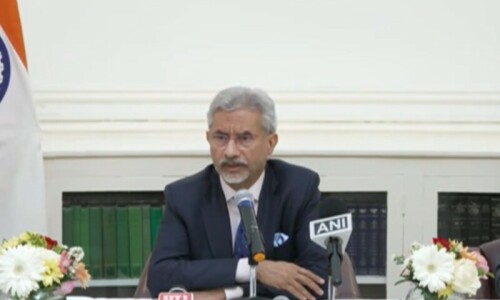

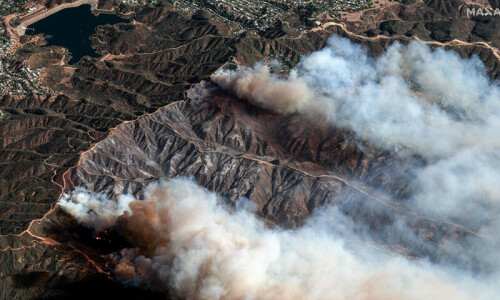






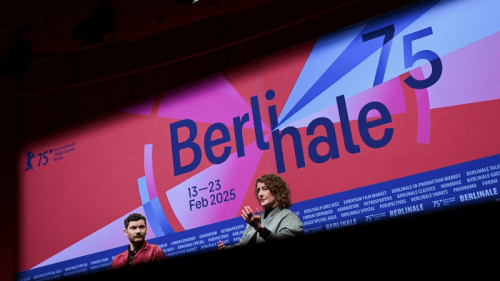








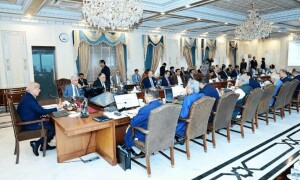

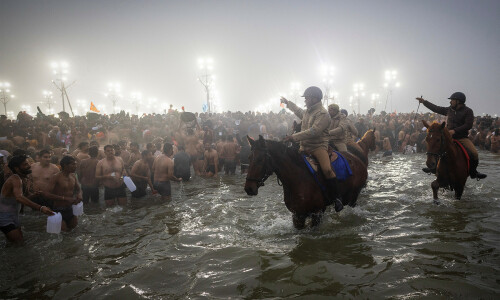








Dear visitor, the comments section is undergoing an overhaul and will return soon.